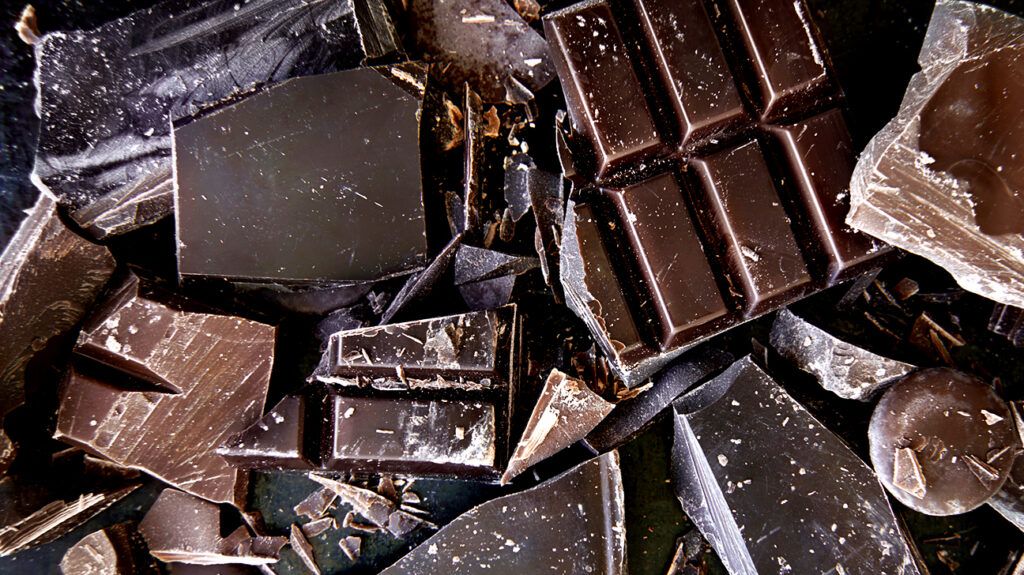Some people may feel constipated after eating chocolate, but there is not any solid research to support a strong connection between chocolate and constipation.
Constipation involves not passing stools often enough or passing dry, painful stools. Diet can play a role in constipation, and certain health conditions can make constipation more likely.
This article explores whether chocolate can cause or contribute to constipation. It also discusses common causes of constipation, treatment options, when to contact a doctor, and more.

Everyone processes food differently, and some people may experience changes in bowel movements after eating chocolate that may result in constipation.
A
There is no evidence that the cocoa in chocolate directly causes constipation. However, chocolate contains other ingredients that have closer links to constipation.
Milk
Chocolate bars commonly contain milk. Dairy produce can trigger constipation in around 30% of those with lactose intolerance, according to a
Learn more about lactose intolerance and constipation.
Sugar
As a candy, the typical chocolate bar contains a lot of sugar. The results of a
Caffeine
Some people link the caffeine in chocolate to an increased risk of dehydration and constipation.
However, an older
Learn about how coffee can stimulate bowel movements.
Constipation may occur when stool
Digestive conditions such as IBS might also play a key role in constipation’s development.
Lifestyle changes or adjustments to daily routine
Changes to a person’s daily routine or life might trigger periods of constipation, including:
- pregnancy
- aging
- travel
- not getting enough regular physical activity
- changing diet or medications
- ignoring the urge to poop
- taking certain medications or dietary supplements that trigger constipation as a side effect
Issues with health and nutrition
Low intake of certain nutrients and health conditions that affect how the gut works can affect how the body passes waste. These health and nutritional issues include:
- low fiber intake
- dehydration
- celiac disease
- nervous system, brain, and spine disorders, such as Parkinson’s disease
- diabetes and other conditions that affect how the body uses energy
- conditions that affect hormones, including hypothyroidism
- gut inflammation
- blockages and tumors of the anus and rectum
- problems with the makeup and layout of the digestive tract
Treating the underlying cause may help reduce constipation.
Learn about foods that can cause constipation.
People may be able to treat mild constipation at home by increasing how much fiber they eat and water they drink.
Recommended fiber intake varies depending on a person’s age and sex, but the National Institute of Diabetes and Digestive and Kidney Diseases (NIDDK) recommends consuming around
A person can also try to manage constipation at home by:
- increasing their level of physical activity
- practicing bowel training techniques, such as attempting to pass stools at the same time every day or after meals
- switching out medications or supplements that could be responsible, with a doctor’s advice
- speaking to a pharmacist about over-the-counter (OTC) laxatives, possibly including:
- fiber supplements
- osmotic agents
- stool softeners
- lubricants
- stimulants
Stimulant laxatives are usually only suitable in severe cases or after attempting other treatments.
A doctor may prescribe one of several prescription medications if lifestyle adjustments or OTC medications are not successful. These medications may include:
- lubiprostone, which increases fluid in the digestive tract
- linaclotide, which helps people with IBS have more regular bowel movements
- prucalopride, which stimulates the colon to move stool
Learn more about home remedies for constipation.
It is important to contact a doctor if an individual notices the following symptoms alongside constipation:
- bleeding in the rectum or bloody stools
- ongoing abdominal pain
- inability to pass gas
- high body temperature
- nausea and vomiting
- lower back pain
- unintended weight loss
If a person has a family history of colorectal cancer or their constipation does not improve with home treatment, it may be best to consult a healthcare professional.
A doctor can determine the cause of constipation and advise on a suitable treatment plan.
Here are some frequently asked questions about chocolate and constipation.
Does chocolate affect your bowel movements?
Chocolate may affect bowel movements in people who cannot tolerate milk, sugar, or caffeine well. For example, the caffeine content in chocolate may increase how much acid the gut produces in people with IBS and contribute to diarrhea, according to a
However, there is little connecting chocolate to constipation specifically.
What foods cause the most constipation?
According to the
- fatty meats
- dairy products
- eggs
- processed foods
What foods should people avoid for constipation?
The cause of constipation may be different for each person. For example, people with IBS
- chips
- fast food
- meat
- prepared foods, such as some frozen meals and snack foods
- processed foods, such as hot dogs or some microwavable dinners
If a person believes they are experiencing constipation as a result of their diet, a dietitian can help them identify foods that may be responsible and help them create a suitable eating plan.
Does sugar cause constipation?
A
Is dark chocolate good for constipation?
Some components of chocolate have shown positive effects on constipation in children. For example, an older
Chocolate does not have any confirmed link with constipation. However, some of its ingredients, such as milk and sugar, can trigger bowel changes and constipation symptoms in some people.
More commonly, certain foods, underlying health problems such as IBS, and a sedentary lifestyle can cause constipation.
People may be able to manage constipation by drinking plenty of water and eating enough fiber. OTC remedies such as laxatives are also available. It is best for a person to contact a doctor if constipation symptoms persist or are severe.
